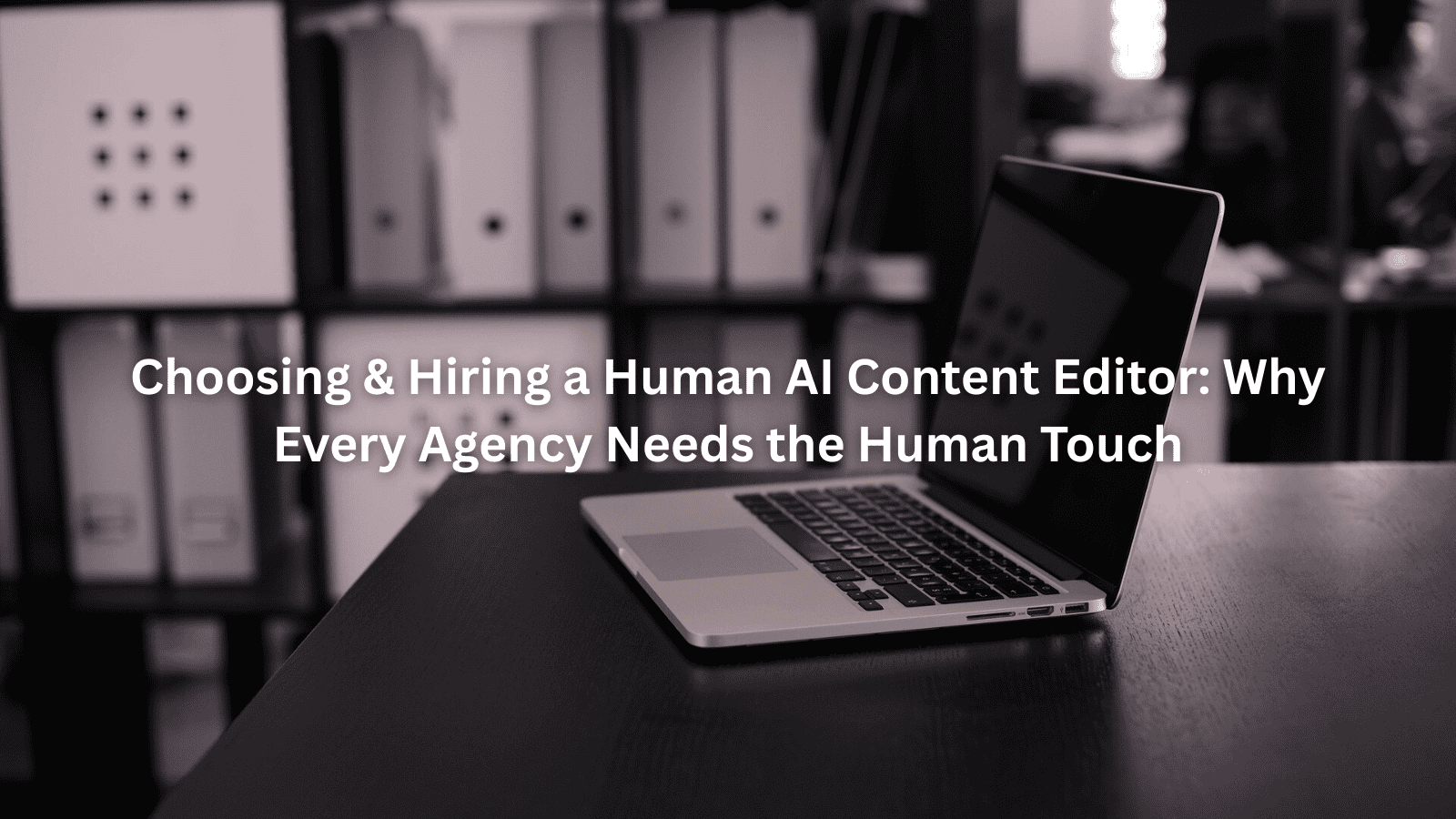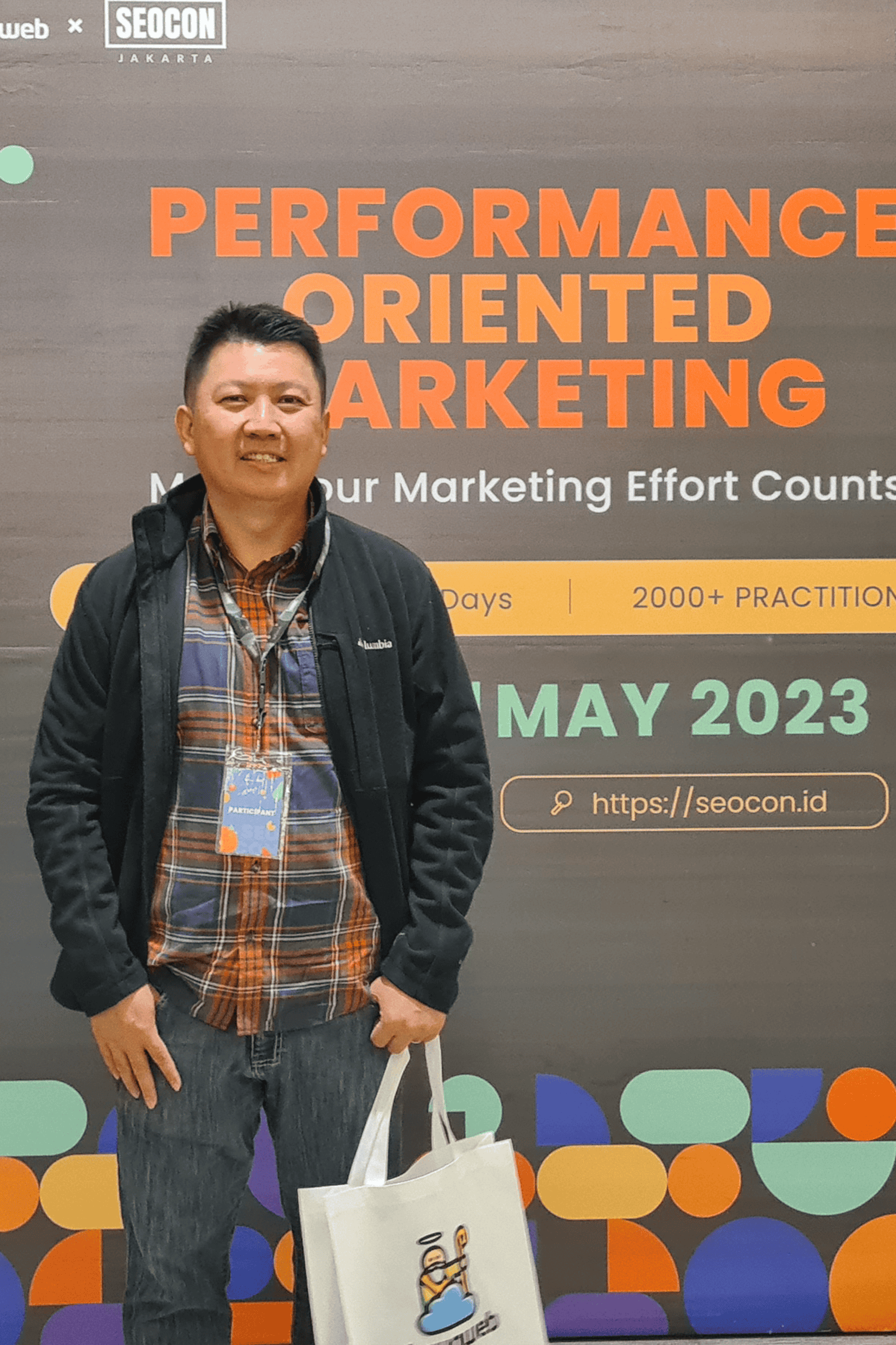Use a human AI content editor to shape AI drafts into meaningful, engaging pieces. They refine grammar, style, and tone, ensuring every article aligns with your brand voice. Ask for AI tool experience and review their editing samples to verify expertise. Prioritize editors who can adapt, communicate, and elevate content beyond what automation alone can achieve.
Key Takeaway
- Human AI content editors are crucial for context, creativity, and quality.
- Vetting skills and reviewing a portfolio are non-negotiable steps.
- Combining AI efficiency with human editing, as we do at Jet Digital Pro, brings the best results.
Why Human AI Content Editors Matter More Than Ever
The first time we tried publishing raw AI-generated content on a client’s blog, it landed with a thud. Sure, the sentences were mostly correct, and the structure was there, but the soul was missing. Readers could sense the flatness, and engagement dropped. That’s when we realized: AI might write, but only a human can edit for connection.
AI content editing is everywhere now. According to industry data, 90 percent of marketers will lean on AI by 2025, but 58 percent already see the need for real editors to make content actually work. We’ve seen AI boost our productivity by 66 percent, but we never trust an algorithm alone to polish our final drafts.
A human content editor does more than fix typos. They catch subtle errors, adjust the tone, smooth transitions, and make sure the piece feels right for real people. This includes correcting grammar, enhancing readability, aligning with your brand voice, and fact-checking for accuracy. In our experience, combining AI and human review through a proven AI content editor process is the only way to get content that ranks and resonates.
When you’re looking for editorial review, don’t just ask if someone knows AI tools. Ask how they turn a machine’s draft into a story. That’s the difference your audience will notice.
Best Human AI Editing Services: What Sets the Top Apart
Someone once sent us a sample from an “AI editing service.” It read like a user manual, full of jargon, with no hint of personality. That’s not the standard you want.
The best human AI editing services, ours included, go far beyond grammar correction or basic copyediting. Here’s what distinguishes a truly expert team:
- Semantic editing: Editors understand context and can reshape sentences so meaning is clear and precise.
- Tone adjustment: They tailor the writing to match your brand voice and audience expectations, not just “fix errors.”
- Brand voice alignment: You get consistency across every piece of content, whether it’s a blog, landing page, or white paper.
- Fact-checking and plagiarism detection: Editors verify facts and ensure all content is original and properly sourced.
- SEO editing and keyword integration: The best services, like ours at Jet Digital Pro, optimize for search engines using both primary and LSI keywords, naturally woven into the text.
- Cultural sensitivity and inclusive language: They catch unintended bias and adapt content for diverse audiences.
We believe in editorial workflows that include feedback incorporation, revision management, and adherence to your unique style guide. It’s not just about checking boxes; it’s about adding value at every step. [ 1 ]
The Cost to Hire a Human AI Editor
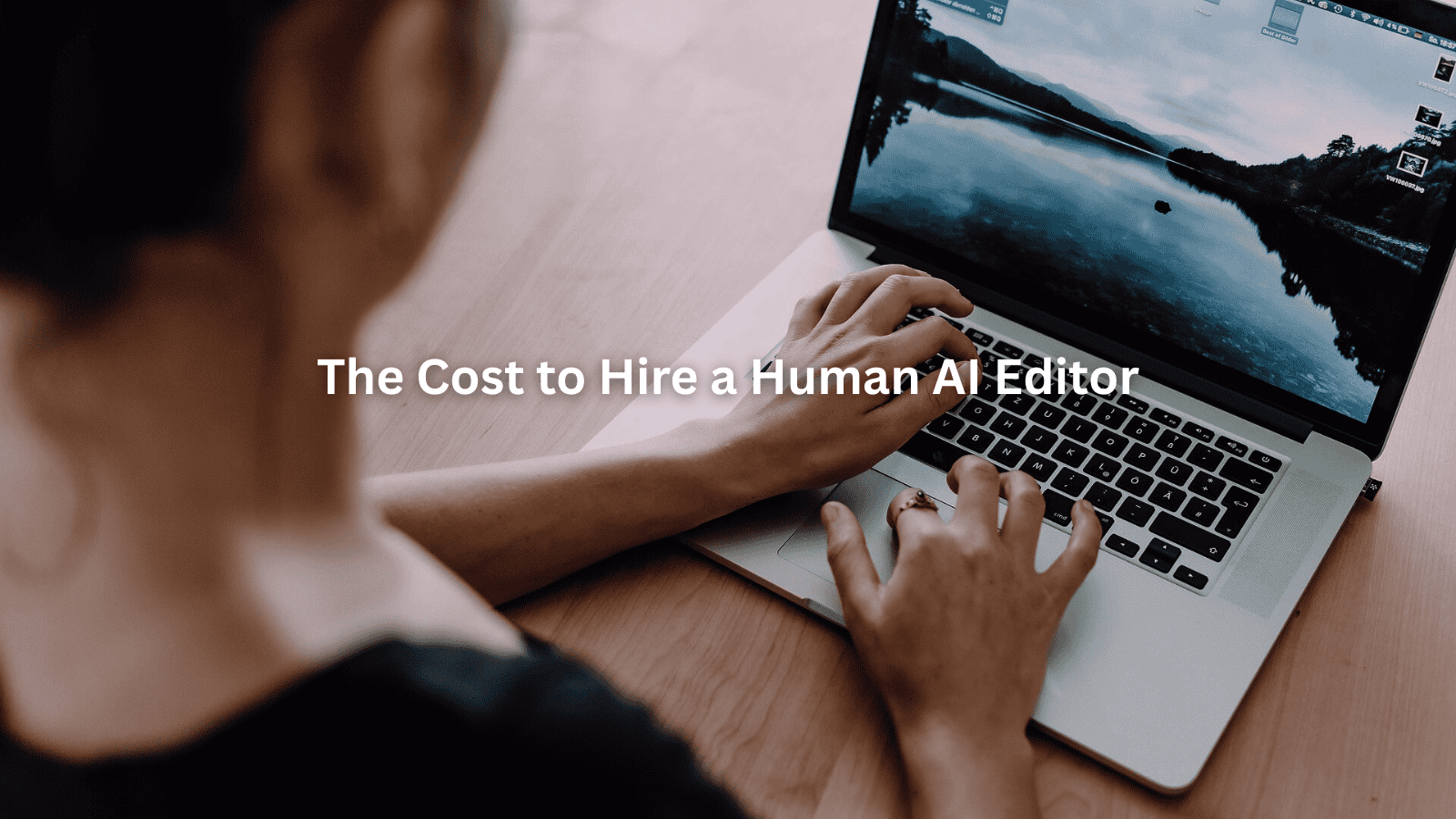
We get asked about rates all the time. How much should you budget for a human AI content editor? The answer depends on experience, project scope, and the level of expertise needed.
Freelance human AI editor rates typically range from $30 to $100 per hour, with some charging per word (about $0.03 to $0.10). Long-term or contract editors might offer a retainer or project-based pricing, especially for ongoing content editing and editorial review.
At Jet Digital Pro, we structure pricing based on volume, turnaround expectations, and specialized needs (like technical editing or industry knowledge). We’re transparent about costs up front, no surprises.
What’s worth remembering:
- Entry-level editors cost less, but may lack AI tool proficiency.
- Subject matter experts and editors with SEO experience command higher rates.
- Remote and freelance editors can be more flexible but require thorough vetting.
We recommend budgeting for quality, not just speed. The right editor will pay for themselves in content performance and audience engagement.
How to Find an Expert Human for AI Content
Finding a great editor isn’t luck, it’s a process. We’ve made a few mistakes along the way (once hired someone who didn’t know how to run a simple plagiarism check), so we’ve learned to look for a few non-negotiables.
Start by defining your needs. Do you want someone for technical editing? Content localization? Fact-checking and compliance editing? Be clear in your job description. [ 2 ]
Next, look in the right places:
- Freelance platforms: Good for quick hires, but vetting is on you.
- Content agencies: Many now specialize in AI content editing.
- Professional networks: LinkedIn or editing associations offer vetted candidates.
We always ask for editing portfolios, especially samples of AI-edited work. A short editing test, using an AI-generated draft, shows how they handle context analysis, tone adjustment, and message consistency.
When you vet skills, look for:
- Editing tools proficiency (Grammarly, Hemingway, SurferSEO)
- AI tool familiarity (ChatGPT, Jasper, etc.)
- Content strategy understanding
- Strong communication and feedback skills
The best editors are adaptable, responsive, and willing to learn your brand’s unique requirements. We’ve found that a short, real-world test reveals more than any resume.
Freelance Human AI Editor Rates: Breaking Down the Numbers
We’ve hired dozens of freelance editors, so we know the market. Rates vary, but here’s what you can usually expect:
- Entry-level: $20-$35 per hour. Good for light proofreading or basic grammar correction.
- Mid-level: $40-$65 per hour. Includes style guide adherence, tone adjustment, and some SEO editing.
- Expert-level: $70-$120 per hour. For narrative enhancement, advanced fact-checking, and strategic content editing.
Rates can also be per word ($0.03-$0.10) or per project. We prefer hourly or project rates for flexibility.
Remember:
- Technical or industry-specific content costs more.
- Rush jobs or weekend work may add fees.
- Long-term contracts often mean lower rates per project.
Transparency is key. We always outline costs before starting, and recommend you do the same with any freelance editor you hire.
How to Find a Human AI Editor: Step-by-Step
We’ve developed our own checklist for hiring, after learning the hard way that skipping steps leads to headaches.
- Define your content goals. What do you need: blog posts, white papers, landing pages?
- Set clear expectations. List required skills, expected turnaround, and preferred editing tools.
- Post the job in trusted places. We’ve had luck with professional networks and direct referrals.
- Ask for a portfolio or sample review. Real examples speak louder than credentials.
- Run a short editing test. Use an actual AI-generated piece for realism.
- Interview top candidates. Ask about their approach to semantic editing, bias detection, and content optimization.
- Check references. It’s old school, but it works.
This process helps us separate true experts from those just looking to make a quick buck.
Portfolio Review: What to Look for in a Human AI Content Editor
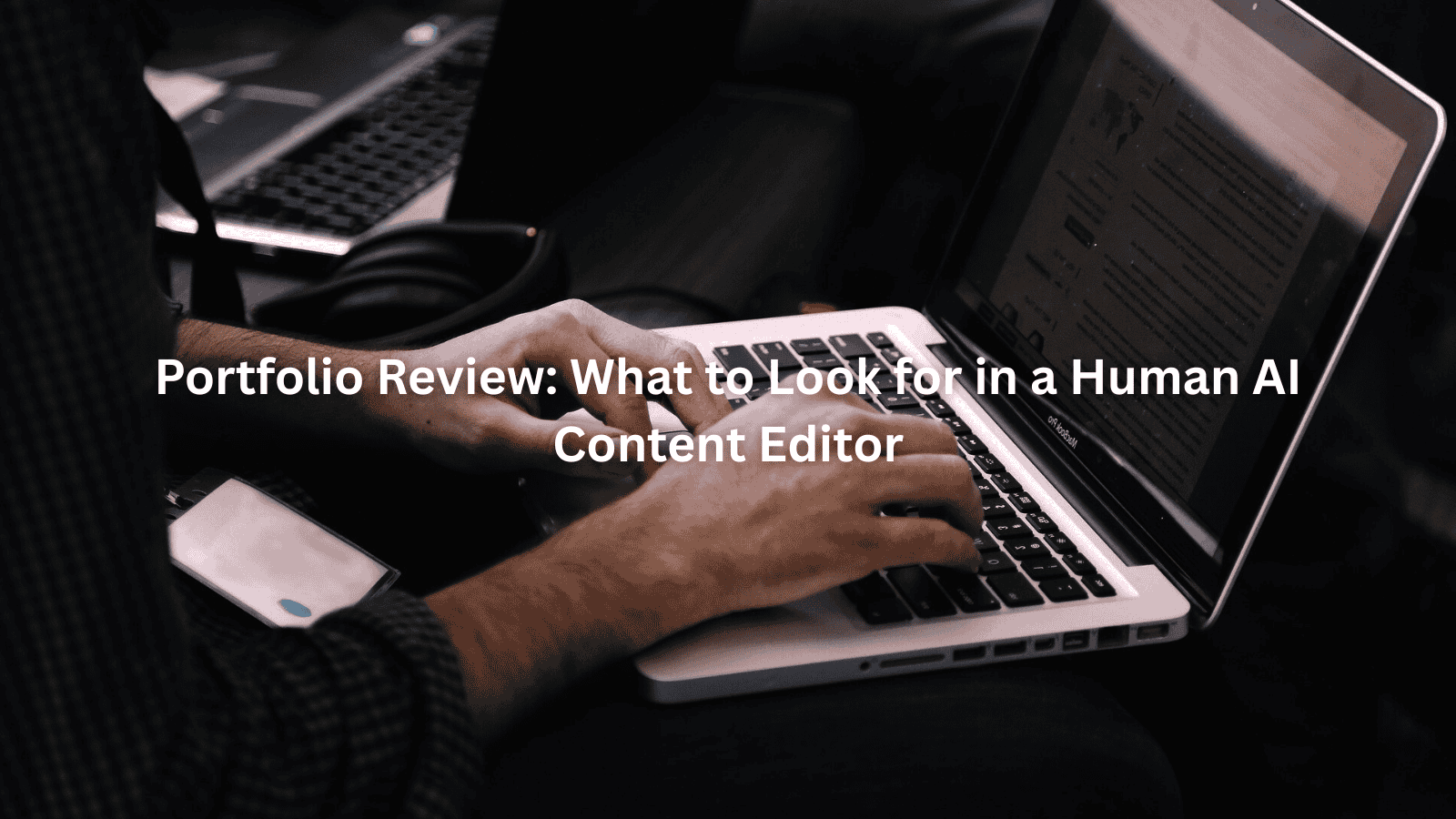
A portfolio tells you everything you need to know, if you know what to look for. We’ve seen portfolios padded with generic work, so we dig deeper.
Check for:
- Diverse content types: Blogs, web pages, technical documents.
- AI-edited samples: Look for before-and-after comparisons.
- Keyword integration and SEO editing: Is the content optimized?
- Clarity improvement and readability: Are sentences concise and paragraphs well-organized?
- Brand voice consistency: Does the tone match across multiple pieces?
We ask for commentary on editing choices. Why did they restructure that sentence? How did they improve context or remove bias? This reveals their thought process and attention to detail.
Qualities of a Good Human AI Editor
The best editors we’ve hired share a few traits. Sure, technical skills matter, but attitude counts, too.
Look for:
- Attention to detail: They spot inconsistencies, grammar slips, and factual errors.
- Adaptability: Willing to learn new tools and adjust to evolving brand guidelines.
- Strategic thinking: They see the big picture, not just the sentence in front of them.
- Communication skills: Can explain changes and accept feedback.
- Creative editing: They improve narrative flow and audience engagement, not just fix typos.
Are You a Digital Agency?
White Label SEO Content Services for Agencies
Scalable, customizable, and results-driven content solutions for your clients.
We value editors who ask questions, seek context, and aren’t afraid to challenge an awkward phrase. If they can tell you why a sentence works, or doesn’t, they’re probably a keeper.
Questions to Ask a Human AI Editor Before Hiring
We’ve developed a list of questions that reveal more than a resume ever could. Here’s what we always ask:
- How do you approach editing AI-generated drafts?
- What editing tools or AI platforms are you most comfortable with?
- How do you ensure content aligns with our brand voice?
- Can you describe a time you found and fixed a factual or contextual error in AI-generated content?
- What’s your process for handling feedback and revisions?
- How do you stay updated on SEO best practices and content trends?
- Can you provide before-and-after samples of your editing work?
Their answers tell you if they understand editorial workflow, structural editing, and narrative enhancement, not just grammar correction.
Vetting Human AI Editor Skills: What We Look For
We never skip skill vetting, no matter how good someone’s portfolio looks. We want editors who are comfortable with both AI and traditional editing.
Our process:
- Test editing: Give them an AI-generated article to improve.
- Grammar and style test: Can they spot subtle errors?
- SEO and keyword integration: Do they know how to optimize for search relevance?
- Fact-checking and data verification: Are they thorough?
- Content repurposing and localization: Can they adapt content for different audiences?
We also assess editing tools proficiency, familiarity with SEO editing, and ability to work within tight deadlines. If they can tick all these boxes, we know they’ll be a strong fit for our content strategy.
Where to Hire a Human AI Content Editor
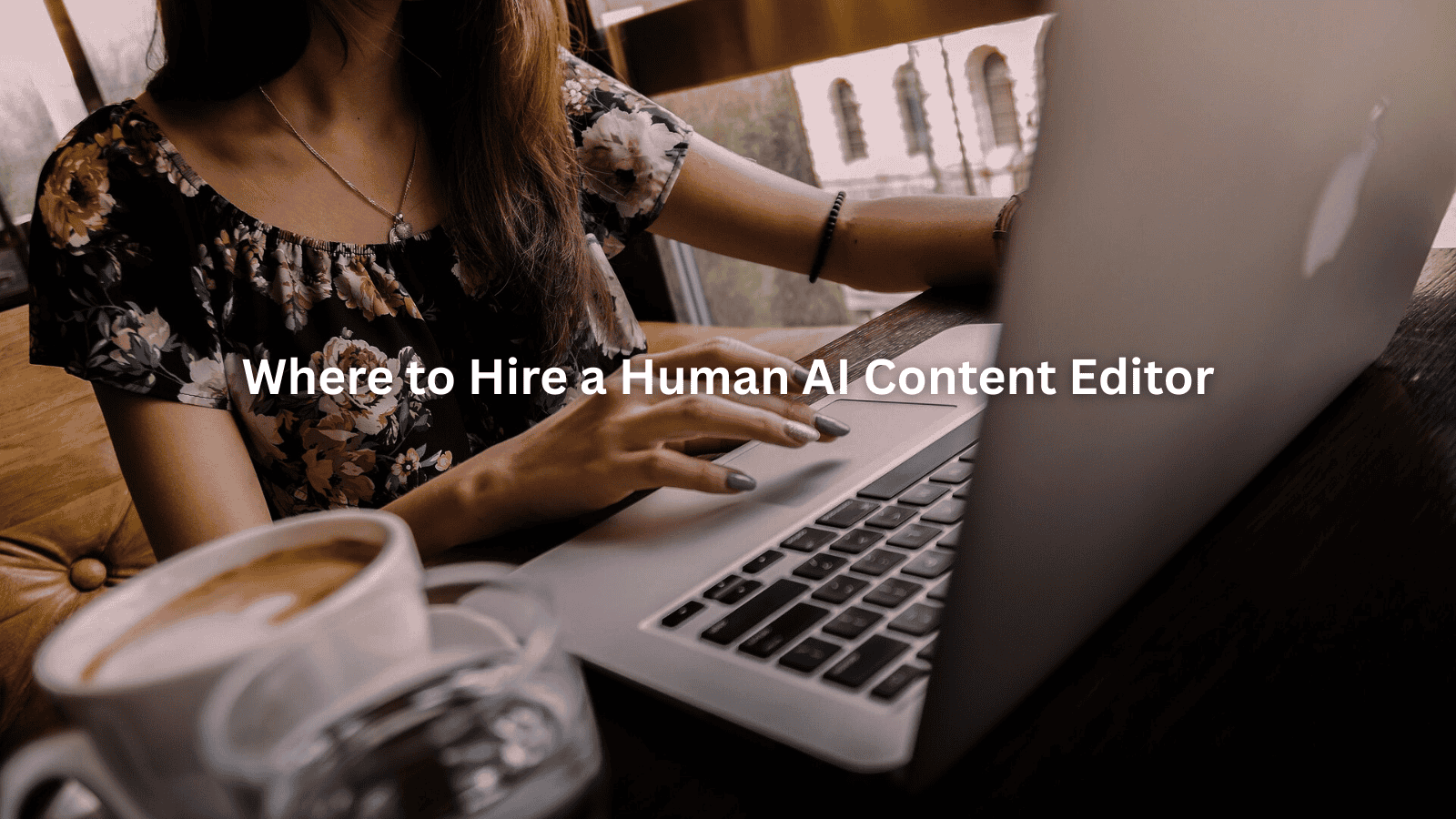
Finding the right editor is part research, part instinct. Here’s where we look:
- Freelance platforms: Good for quick hiring, but vet thoroughly.
- Content agencies: We offer dedicated human AI editing as part of our white-label solutions.
- Professional networks: Editing associations and LinkedIn are full of skilled editors.
- Referrals: Trusted recommendations often yield the best matches.
We prefer working with editors who understand our workflow and brand standards. At Jet Digital Pro, we bring together AI tool familiarity, subject matter expertise, and a hands-on editing approach for agencies that want reliable, Google-resilient content.
Practical Advice: Getting the Most Out of Your Editor
Here’s what we’ve learned after years of trial and error:
- Set clear guidelines. Share your style guide, tone expectations, and sample content up front.
- Give actionable feedback. Be specific about what works and what doesn’t.
- Incorporate regular check-ins. A weekly call or email keeps everyone aligned.
- Use editing metrics. Track engagement, bounce rate, and keyword performance to measure success.
- Prioritize continuous improvement. Editors should always be learning and adapting.
The best results happen when editors feel part of your team, not just an outsourced service. We treat our editors as partners, and it shows in every article we publish.
Need a Strategic SEO Content Partner?
Let’s craft SEO content that ranks, converts, and grows your brand.
Talk to UsIf you want content that’s more than just words on a page, you need a human AI content editor who gets your goals and your audience. We’ve built our reputation at Jet Digital Pro by combining AI efficiency with human skill, delivering SEO content that stands out, and passes every test, human or algorithmic.
FAQ
How do I know if an AI content editor understands my industry?
Ask for editing samples or a portfolio that shows experience in your field, not just general writing. Look for subject matter expertise, editors who’ve worked with similar topics or can discuss industry terms with confidence. We’ve found that editors who ask smart questions about your audience and products are usually the ones who get context right from the start.
What’s the best way to test an editor’s ability with AI-generated drafts?
Give them a real AI-generated sample and ask for specific improvements. Request changes in tone, clarity, and keyword use. We often ask editors to explain their editing choices, too. This way, you get a sense of their approach to semantic editing and see if they can turn stiff AI text into something that feels natural and on-brand.
Should I require editors to use certain editing tools or AI platforms?
It depends on your workflow. If you have a preferred AI tool or editing platform, mention this in your job listing. We usually check for basic proficiency in tools like Grammarly or SurferSEO and see if editors are open to learning new systems. Flexibility is good, but some familiarity with your tech stack can save time during onboarding.
How do I judge if an editor can maintain our brand’s voice across different content types?
Ask for before-and-after samples for various formats, blog posts, product descriptions, social posts. Pay attention to consistency in tone and message. We like to run a short test where editors revise two different types of content, checking if they keep the same “feel” while adjusting for format. Editors who can do this well are rare, but worth finding.
Are there legal or ethical issues when hiring freelance human AI content editors?
Yes, there can be. Make sure editors understand copyright, source attribution, and privacy standards. We always clarify expectations about plagiarism checks and use of third-party content. It’s smart to have a contract outlining these points and to ask editors about their process for verifying facts and avoiding bias. This protects both your agency and your audience.
Conclusion
Bringing a human AI content editor into your workflow means your content gets the clarity, nuance, and engagement automation alone can’t deliver. At Jet Digital Pro, we blend AI-driven speed with an 11-step human editing process to turn drafts into stories that connect, rank, and stand the test of Google updates. If your agency wants scalable, Google-resilient SEO content that truly stands out, let’s talk. Contact us today to elevate your content.
References
- https://vocal.media/futurism/ai-and-the-future-of-writing-threat-or-tool
- https://www.finextra.com/the-long-read/1257/how-to-use-ai-to-get-a-new-job-this-year
P.S – Whenever you’re ready,
we’re here to help elevate your SEO content.
Partner with us for strategic, scalable content that drives real organic growth.
Contact Us Now
